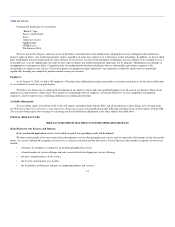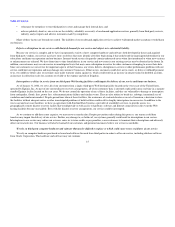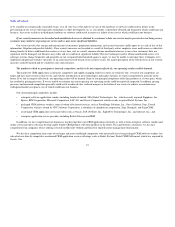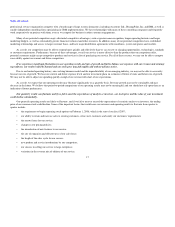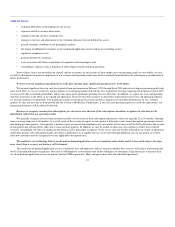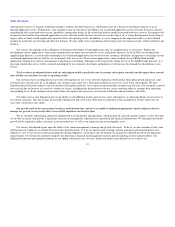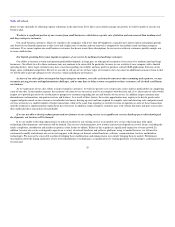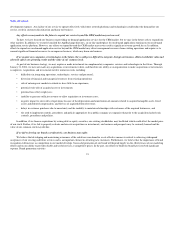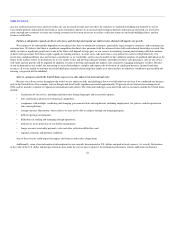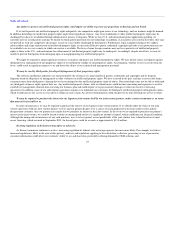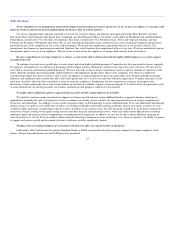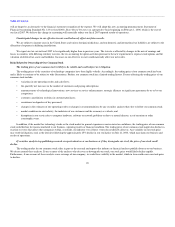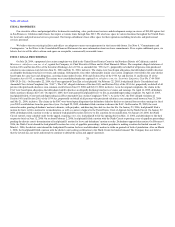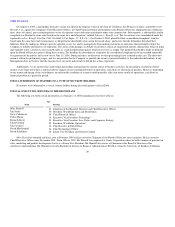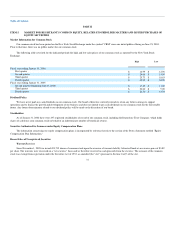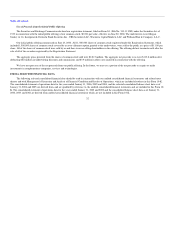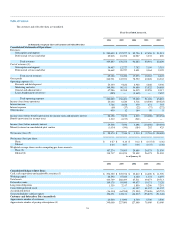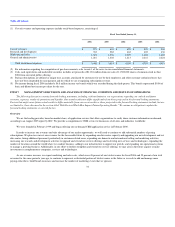Salesforce.com 2005 Annual Report Download - page 27
Download and view the complete annual report
Please find page 27 of the 2005 Salesforce.com annual report below. You can navigate through the pages in the report by either clicking on the pages listed below, or by using the keyword search tool below to find specific information within the annual report.
Table of Contents
restricting our ability to store, process and share data with our customers. In addition, taxation of services provided over the Internet or other charges imposed
by government agencies or by private organizations for accessing the Internet may also be imposed. Any regulation imposing greater fees for Internet use or
restricting information exchange over the Internet could result in a decline in the use of the Internet and the viability of Internet-based services, which could
harm our business.
Privacy concerns and laws or other domestic or foreign regulations may reduce the effectiveness of our solution and adversely affect our business.
Our customers can use our service to store contact and other personal or identifying information regarding their customers and contacts. Federal, state
and foreign government bodies and agencies, however, have adopted or are considering adopting laws and regulations regarding the collection, use and
disclosure of personal information obtained from consumers and individuals. The costs of compliance with, and other burdens imposed by, such laws and
regulations that are applicable to the businesses of our customers may limit the use and adoption of our service and reduce overall demand for it. Furthermore,
privacy concerns may cause our customers' customers to resist providing the personal data necessary to allow our customers to use our service effectively.
Even the perception of privacy concerns, whether or not valid, may inhibit market adoption of our service in certain industries. For example, regulations such
as the Gramm-Leach-Bliley Act, which protects and restricts the use of consumer credit and financial information, and the Health Insurance Portability and
Accountability Act of 1996, which regulates the use and disclosure of personal health information, impose significant requirements and obligations on
businesses that may affect the use and adoption of our service.
The European Union has also adopted a data privacy directive that requires member states to impose restrictions on the collection and use of personal
data that, in some respects, are far more stringent, and impose more significant burdens on subject businesses, than current privacy standards in the United
States. All of these domestic and international legislative and regulatory initiatives may adversely affect our customers' ability to collect and/or use
demographic and personal information from their customers, which could reduce demand for our service.
In addition to government activity, privacy advocacy groups and the technology and other industries are considering various new, additional or different
self-regulatory standards that may place additional burdens on us. If the gathering of personal information were to be curtailed in this manner, CRM solutions
would be less effective, which may reduce demand for our service and harm our business.
Our business is subject to changing regulations regarding corporate governance and public disclosure that have increased both our costs and the
risk of noncompliance.
We are subject to rules and regulations by various governing bodies, including the Securities and Exchange Commission, New York Stock Exchange
and Public Company Accounting Oversight Board, that are charged with the protection of investors and the oversight of companies whose securities are
publicly traded. Our efforts to comply with these new regulations, most notably the Sarbanes-Oxley Act, or SOX, have resulted in, and are likely to continue
to result in, increased general and administrative expenses and a diversion of management time and attention from revenue-generating activities to compliance
activities.
We are required to comply on an on-going basis with the SOX requirements involving the assessment of our internal controls over financial reporting
and our independent public accountants' audit of that assessment. These requirements first became applicable to us on January 31, 2006. Our efforts to comply
with the SOX requirements has required, and will continue to require the commitment of significant financial and personnel resources.
Moreover, because these laws, regulations and standards are subject to varying interpretations, their application in practice may evolve over time as new
guidance becomes available. This evolution may result in continuing uncertainty regarding compliance matters and additional costs necessitated by ongoing
revisions to our disclosure and governance practices. If we fail to address and comply with these regulations and any subsequent changes, our business may be
harmed.
24


